Andrew Scott Thinks Tom Ripley’s Sexuality Is Murky

As a lover of the 1999 film The Talented Mr. Ripley, Andrew Scott had a few questions before agreeing to star in Oscar winner Steve Zaillian‘s macabre mini-series based on Patricia Highsmith’s classic novel. “One of my first questions was, ‘Why do this?’” Scott recalled while appearing as a guest on Still Watching. Thankfully, Zaillian was prepared for Scott’s query.
“Zaillian was very clear about the kind of vision that he had for this version of the story,” Scott said. That’s not to say that Zaillian had all the answers from the jump. “He didn’t immediately say that he wanted to do it in black and white, but that sort of emerged. He mentioned aging up the characters—I’m older than the actors who played the character before in previous iterations of this story. You gotta bring your your own stuff to it or else it’s pretty pointless to me.”
What they brought became the moody period piece Ripley, which has remained on Netflix’s top ten list since it premiered April 4. In Scott’s capable hands, Tom Ripley, memorably portrayed by Matt Damon in Anthony Minghella’s 1999 film, becomes a colder and more calculating con artist, willing to do whatever it takes to get away with the murder of dilettante Dickie Greenleaf (Johnny Flynn) and evade capture in Italy.
“I think what’s fascinating and enduring about this character is that he’s sort of like water,” Scott says of the elusive Tom. “There’s a fluidity to him that we can’t quite put our finger on. For that reason, he holds a sort of power over us.”
Below, Scott chats with Still Watching about the murkiness within Tom, doing Ripley drag, and pulling off those complicated murder sequences.
In Ripley, I really felt the striver in Tom: the class consciousness, his desire to enter a new station in life. How much were you thinking about politics and class?
Andrew Scott: For me, the story is so much about somebody who hasn’t been given access to the beautiful things in life, even though he’s deeply talented. We say he’s a con artist, but he’s nevertheless an artist. We see him at work and how unobserved he is and how dismissed he is by society. The only way he has to survive is by defrauding people, by turning to crime. That’s not obviously an excuse for him, but, you know, you look for ways to advocate for the character. And then he’s submerged into this society where people who have half the talent that he has are given access to all the beautiful things in the world. They could call themselves artists—they have everything at their disposal—and a sort of rage begins to emerge within him.
There is a notion of class and morality, and also about sexuality as well. I think there’s a kind of murkiness to Tom’s sexuality, whether it’s envy or lust or love or obsession. Something about the “Dickiness” of Dickie gets him obsessed in some way, and he wants what he has.
I asked all those questions about the character and how much we should label him in relation to where he might come from, or what exact age he might be, or what his exact sexuality might be, or what his exact pathology might be. But all those questions to me sometimes were more interesting than the answers. I think what’s fascinating and enduring about this character is that he’s sort of like water. There’s a fluidity to him that we can’t quite put our finger on. For that reason, he holds a sort of power over us.
The two murder sequences—specifically the one on the boat—are so intense. And I have to imagine filming them must have been just absolutely wild.
It’s incredibly complicated and time consuming. We talked a lot about how it’s easy to murder someone, but disposing of the body is pretty, pretty difficult. I think it’s very important that we see this very intelligent character think. We really see him think and not just think in an expert way, but also to see him make mistakes and to work things out.
We were not aided at all by a score in that scenario. We’re just at the sort of deadly silence of those surroundings. A lot of that stuff was sheer physical effort. To try and get back up on a boat, it’s a difficult thing to do when you’re coming out of deep water and when you’re exhausted. So is lifting rocks to try and bury a boat. We certainly did a lot of coverage on all that kind of stuff. So it’s just exhaustion, and that’s how you work it out. What exactly might happen, what the logistics of lighting something on fire might be and when you would be really exhausted. When you’re thinking with your heart and when you’re thinking with your head, there’s something about the emotionality of what he’s just done that I don’t think comes into play until later on in the episode. I think, practically, he’s fighting for his life. And then, like us all, when we go through trauma, that trauma kind of returns to him later on.
Another favorite moment was when Ripley basically does Tom Ripley drag, with the beard and the wig. What was it like filming that scene?
What’s sort of interesting about the whole Ripley story is that it’s a period piece. Tom’s way of imitating other people in 2024 would be so vastly different—there’s so much more surveillance and all that kind of stuff. So, the question of what’s plausible and what’s not plausible is a big one. We talked about how much you could get away with and how little you can get away with. How you play with whoever you’re talking to, what their intelligence level might be or what their observation skills might be.
So we experimented a little bit with the idea that [Inspector Ravini] wouldn’t recognize him at all, with very little disguise. Ultimately, you have to have something. Otherwise I think the inspector would just be like, ‘Yeah, aren’t you [Dickie?]?’ But having said that, there are an awful lot of times where people whose job it is to look at two different forms of passport and ID… I mean, anyone who’s tried to get into a bar using a fake ID when they were a teenager will tell you that it depends on the bouncer [laughs]. Like, ‘That bouncer is not noticing.’ It just depends on who you get, and a lot of it isn’t really down to necessarily Tom’s expertise or lack of expertise, but the observational skills of the observer.
This interview has been edited and condensed.
-
Anne Hathaway on Tuning Out the Haters and Embracing Her True Self
-
And the MAGA Mutiny That Brought McCarthy’s House Down


